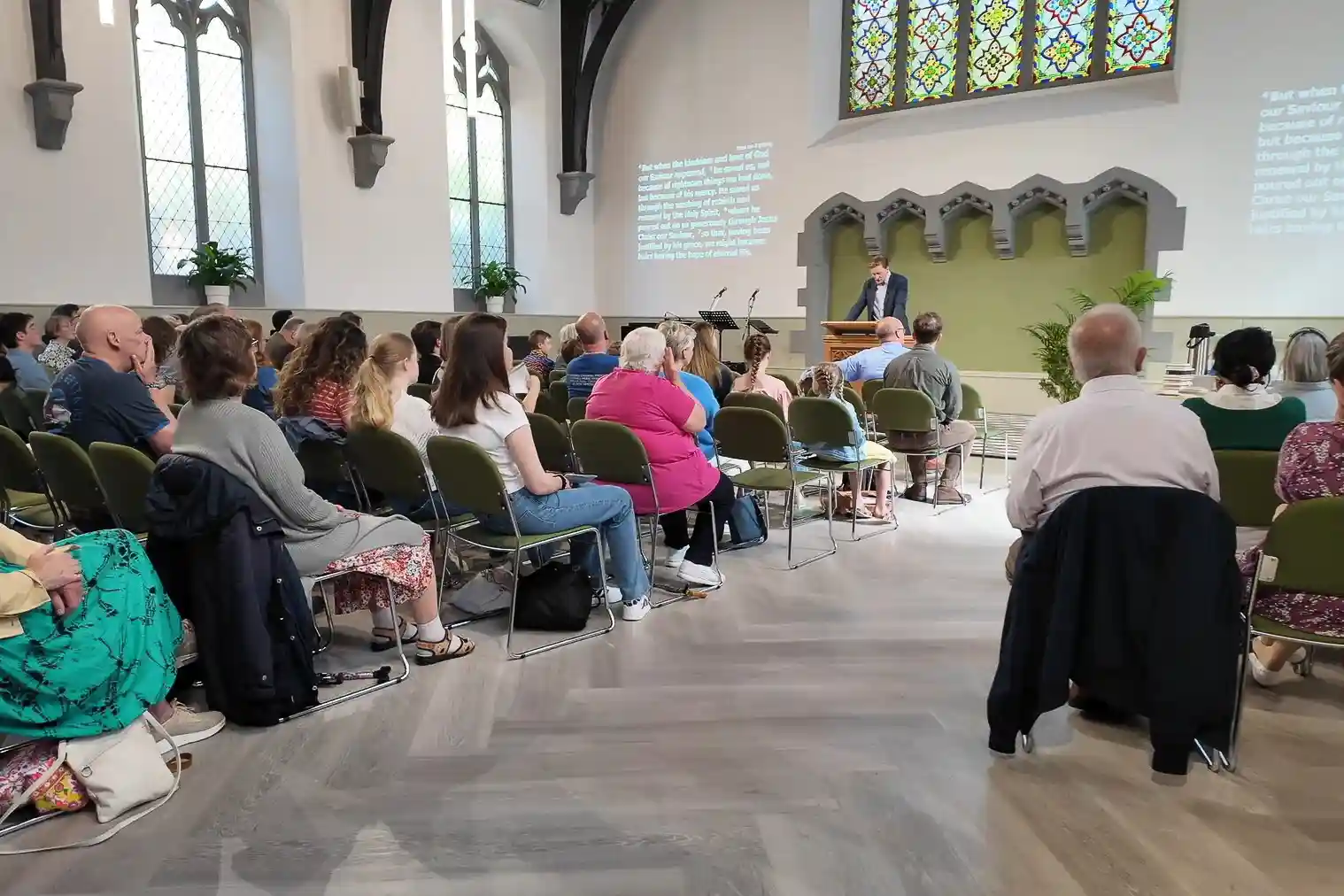A Biblical Theology of Global Missions

As I travel around the country for work, I’ve heard multiple objections to churches being engaged in global missions, either by sending or going. Despite the variety of objections, there has been one constant: a lack of knowledge about what the Bible says regarding global missions. This lack of knowledge shows itself in a wrong theology and practice of missions. What is desperately needed in many American churches, colleges, and seminaries is a biblical theology of missions.
A Missional Hermeneutic
Global missions is not just one topic out of many in the Bible. Global missions is the topic of the Bible. A biblical theology of missions begins with the right hermeneutic—a missional hermeneutic. In “The Mission of God: Unlocking the Bible’s Grand Narrative,” Christopher J.H. Wright writes,
A missional hermeneutic, then, is not content simply to call for obedience to the Great Commission (though it will assuredly include that as a matter of nonnegotiable importance), nor even to reflect on the missional implications of the Great Commandment. For behind both it will find the Great Communication—the revelation of the identity of God, of God’s action in the world and God’s saving purpose for all creation. And for the fullness of this communication we need the whole Bible in all its parts and genres … .

A missional hermeneutic sees the Bible as God’s communication of His plan: the complete redemption of the entire created cosmos, which includes the redemption of all who repent and believe in Christ for salvation.
A missional hermeneutic sees the Bible as God’s communication of His plan: the complete redemption of the entire created cosmos, which includes the redemption of all who repent and believe in Christ for salvation. The Apostle Paul speaks to this in Romans 8:18-25* where he writes that “the creation waits in eager expectation for the sons of God to be revealed … that the creation itself will be liberated from its bondage to decay and brought into the glorious freedom of the children of God … as we wait eagerly for our adoption as sons, the redemption of our bodies.” This is the mission of God as revealed in the Bible. The glory of the triune God as expressed in the redemption of all creation, of which global missions is an extremely important part, is the topic of the Bible. The Bible’s heartbeat is missions.
The Covenant of Redemption
A biblical theology of missions begins outside of time. It begins and finds its grounding in the counsel of the triune God in eternity past. Ephesians 1:9-10 says, “And he made known to us the mystery of his will according to his good pleasure, which he purposed in Christ, to be put into effect when the times will have reached their fulfillment—to bring all things in heaven and on earth together under one head, even Christ.” The mystery of His will is to bring everything in creation under the authority and leadership of Jesus Christ. Part of this mystery includes the redemption of fallen image bearers. In the Ligonier article “What is the Covenant of Redemption?” R.C. Sproul writes, “The covenant of redemption is … specifically between the Father and the Son … . The eternal Word did not decide on His own to come to this planet for its redemption. He was sent here. In the plan of salvation the Son comes to do the Father’s bidding. The point of the covenant of redemption is that the Son comes willingly.” The Father chose those He would save in eternity past and the Son willingly agreed to come to Earth and redeem those chosen ones (Eph. 1:4). This directly ties to a theology of missions because as Sproul writes in the same article, “Jesus is the primary missionary. As the word suggests, a missionary is one who is ‘sent.’” The covenant, or mission, of redemption is the biblical grounds of a theology of missions.
The Creation Mandate
When God created humanity in His image, He gave them a charge, a command, a purpose. God says in Genesis 1:26, “Let us make man in our image, in our likeness, and let them rule over the fish of the sea and the birds of the air, over the livestock, over all the earth, and over all the creatures that move along the ground.” Genesis 2:15 says, “The Lord God took the man and put him in the Garden of Eden to work it and take care of it.” It was Adam’s duty to not only maintain and cultivate the garden, but to extend the garden across the newly created earth. What makes this even more amazing is that within biblical theology, the Garden of Eden is seen as the first temple of God, Adam as the first priest, and the Tree of the Knowledge of Good and Evil as a sacramental tree. We know Adam, the first priest, was to extend the temple garden because God tells him in Genesis 1:28, “Be fruitful and increase in number; fill the earth and subdue it.” The call to be fruitful and increase, to fill and subdue is a call to, as stewards of God, extend His rule and reign across His world.

God’s Creation mandate to His image bearers in Genesis 1 and 2 is a call to global missions! We can’t miss the fact that God’s first words to humanity are missional. It reveals that, like our Creator, we are to be missional.
God’s Creation mandate to His image bearers in Genesis 1 and 2 is a call to global missions! We can’t miss the fact that God’s first words to humanity are missional. It reveals that, like our Creator, we are to be missional. That part of what it means to be human is to be driven by the global mission of our Creator. As Reformed churches, we know that this creation mandate still applies to us today. Although we can’t fully fulfill this mandate currently, and won’t be able to until the return of Christ, we are to still be active in extending the New Covenant temple across the globe, that being the Church of the Lord Jesus Christ for we are God’s temple (Eph. 2:19-22). Therefore, a theology of local and global missions finds strong support in the Creation mandate of Genesis 1 and 2.
The Abrahamic Covenant
This is the first passage that speaks to what is known as the Abrahamic Covenant. Genesis 12:1-3 records God’s words to Abram: “Leave your country … and go to the land I will show you. I will make you into a great nation and I will bless you; I will make your name great, and you will be a blessing. I will bless those who bless you, and whoever curses you I will curse; and all peoples on earth will be blessed through you.” The last part of verse 3 is the most significant for a theology of missions because God says that through Abraham, all people groups on earth will be blessed. The question therefore is how this will happen? The Apostle Paul answers this question in Galatians 3:8, “The Scriptures foresaw that God would justify the Gentiles by faith, and announced the gospel in advance to Abraham: ‘All nations will be blessed through you.’” He goes on to say in Galatians 3:16 that the promises given to Abraham were ultimately given to his singular Seed, the Lord Jesus Christ.
Therefore, it is through the spread of the gospel of the Seed of Abraham, the Lord Jesus Christ, that all families of the earth would be blessed! Global missions is a direct outworking of the Abrahamic Covenant of Genesis 12:1-3. Former MTW West Coast Director Mike Pettengill, in his book “The Beautiful Feet of Missions: An Overview of Modern Missions Thought”writes,
The Abrahamic Covenant provided a blessing for the nations by establishing Israel as the light for the world and by ushering in the gospel of Jesus Christ as the only way to commune with the Lord. … God here formalizes a relation with his people that will result in Israel serving as a “light for the nations” (Isa. 42:6) and turn the followers of Jesus into the disciple makers “of all nations” (Matt. 28:19).

The Abrahamic Covenant provided a blessing for the nations by establishing Israel as the light for the world and by ushering in the gospel of Jesus Christ as the only way to commune with the Lord.
Pettengill also quotes Christopher Wright, “‘God’s promise to Abraham is key to the rest of Scripture. It is the beginning of biblical mission and at the heart of the gospel.’” It is impossible to overstate the significance of the Abrahamic Covenant to a biblical theology of missions. If American churches are to be faithful to God, then we must be about the work He’s given us, the work of sending and going to all peoples with the gospel of the Seed of Abraham.
A Nation and Kingdom of Priests
When God delivered His chosen people out of slavery in Egypt, He gave them this charge, mandate, and purpose: “Now if you obey me fully and keep my covenant, then out of all nations you will be my treasured possession. Although the whole earth is mine, you will be for me a kingdom of priests and a holy nation” (Exod. 19:5-6). Their calling from God was to be a kingdom of priests and a holy nation and part of their responsibility as a kingdom of priests and holy nation was to live such obedient lives that other nations would be amazed and drawn to love, worship, and obey the one true God (Deut. 4:5-8). Theirs was a missional calling. For followers of Christ, that calling has been extended to us in this New Covenant era. The Apostle Peter writes to the Church, including Gentile believers, “But you are a chosen people, a royal priesthood, a holy nation, a people belonging to God, that you may declare the praises of him who called you out of darkness into his wonderful light” (1 Pet. 2:9). Through faith in Israel’s Messiah, Gentile believers have been grafted into Israel’s olive tree and now share in Israel’s covenants (Rom. 11:17; Eph. 2:11-13). This means that the Church now shares in Israel’s covenantal, missional calling to “… declare the praises of him who called [us] out of darkness into his wonderful light” (1 Pet. 2:9b).
Like Israel, we are priests of God and are to “proclaim his salvation day after day [and to] declare his glory among the nations, his marvelous deeds among all peoples” (Ps. 96:2b-3). God didn’t chose Israel just for their sake but also for the sake of the entire world! Anglican theologian Gerald McDermott in his book “Israel Matters” writes, “God chose Israel … precisely for the purpose of reaching the whole world.” In like manner, God has chosen us in Christ to reach those across the street from us (local missions) and those across the sea from us (global missions). The reality that we are, spiritually, a holy nation and kingdom of priests is key to a biblical theology of missions and it’s this truth that ought to lead American churches to the nations.

The reality that we are, spiritually, a holy nation and kingdom of priests is key to a biblical theology of missions and it’s this truth that ought to lead American churches to the nations.
Blessed to be a Blessing
Psalm 67 packs a great missions punch. The psalmist asks God to be gracious to them so that His salvation would be known to all nations. His prayer in his praise is that all people would praise and fear God and that the families of the earth would find their gladness in Him. That the nations would “be glad and sing for joy” (Ps. 67:4). Pastor John Piper states this clearly in his famous work, “Let the Nations Be Glad: The Supremacy of God in Missions,” “Missions is not the ultimate goal of the church. Worship is. Missions exists because worship doesn’t. Worship is ultimate, not missions.” This, the glory and worship of God, is the goal, the purpose, of local and global missions. When our hearts are captivated by the supremacy of the triune God, we will burn with a holy desire and ambition to see all nations glorify Him through their worship. We will send missionaries and go to the nations ourselves with the gospel with our goal being the worship of the triune God. When we see that we have been blessed by God, in Christ, with salvation, we will want to be a salvific blessing to all peoples of the earth by bringing the gospel of salvation to them.
The Reluctant Missionary
A biblical theology of missions is not complete without the book of Jonah. In four chapters, we are told the story of a God who desires to reach Nineveh, Israel’s evil enemy, with His saving love by sending His prophet on a missionary journey. This prophet is understandably resistant and runs away from God and His call on his life. After a series of miraculous events, Jonah ends up in Nineveh, preaches, and the people of that city repent and are spared from God’s judgment. It’s at the beginning and end of chapter four that we are given a key aspect of a theology of missions. Jonah, in an unusual accusation of God, prays to Him, “O Lord, is this not what I said when I was still at home? That is why I was so quick to flee to Tarshish. I knew that you are a gracious and compassionate God, slow to anger and abounding in love, a God who relents from sending calamity” (Jon. 4:2). After a brief dialogue, the book ends with God’s words to Jonah, “But Nineveh has more than a hundred and twenty thousand people who cannot tell their right hand from their left, and many cattle as well. Should I not be concerned about that great city?” (Jon. 4:11).

Behind all of the Bible’s instructions and commands to Israel and the Church regarding global missions is a heart of grace, compassion, patience, and a deep love. We see God’s heart for His fallen and lost image bearers around the world and He wants to use us to reach them!
Behind all of the Bible’s instructions and commands to Israel and the Church regarding global missions is a heart of grace, compassion, patience, and a deep love. We see God’s heart for His fallen and lost image bearers around the world and He wants to use us to reach them! Just as Jesus, the Great Missionary, was sent to “seek and to save the lost,” so we have been sent by our Savior to help reach the world, including our enemies and those we may not like (Luke 19:10; John 20:21). Pettengill reminds us that as those who pride themselves on being biblical, to ask ourselves whether “we, like Jonah, made the determination we will run from God’s command to share His gospel with those across the street and around the globe?”
Lost Sheep in Need of the Shepherd
The New Testament continues this missional hermeneutic and theme for the people of God. In Matthew 9:35-38, our Lord Jesus sees a crowd of people. The Apostle Matthew says that He “had compassion on them, because they were harassed and helpless, like sheep without a shepherd” (Matt. 9:36). Jesus tells us in Matthew 9:37 that the harvest of souls is plentiful, meaning that there are many people in the world today ready to hear the gospel and place their faith in Him. Based on this truth and His compassion for that group of people, and all people of all time, Jesus instructs us to “ask the Lord of the harvest … to send out workers into his harvest field” (Matt. 9:38). What’s even more instructive is that in Matthew 10, Jesus sends out His apostles on their first missionary journey. American churches must continue to lift their eyes and see the harvest, ask the Father to send out local and global missionaries to reap that harvest, and then answer our own prayer by sending and going ourselves.
The Great Commission
Matthew 28:16-20 is the passage most think of when they consider missions and for good reason. It’s here that King Jesus gives His Church her marching orders. He tells us that because He has all authority, we are to “go and make disciples of all nations, baptizing them in the name of the Father, and of the Son, and of the Holy Spirit, and teaching them to obey everything I have commanded you. And surely I am with you always, to the very end of the age” (Matt. 28:18-20). He doesn’t want us to stay inside the four walls of the church. He wants us to go outside the four walls of our churches with the purpose of making disciples, or followers, of Jesus Christ among all nations (i.e. people groups).
The Great Commission is also tied to the Abrahamic Covenant. The Abrahamic Covenant says that all peoples of the earth will be blessed through Abraham. As seen earlier, this is ultimately referring to Abraham’s Seed, Jesus of Nazareth. Jesus has brought salvation for all people groups, not just Israel. The way this salvation spreads to all people groups, or nations, is by the Church obeying the Seed of Abraham and taking His message of salvation to all. The Great Commission is one outworking of the Abrahamic Covenant.

Jesus has brought salvation for all people groups, not just Israel. The way this salvation spreads to all people groups, or nations, is by the Church obeying the Seed of Abraham and taking His message of salvation to all.
The Holy Spirit and Missions
Acts 1:8 is the Great Commission passage of the book of Acts and the foundation of the entire book. Before His ascension, Jesus tells His apostles, “But you will receive power when the Holy Spirit comes on you; and you will be my witnesses in Jerusalem, and in all Judea and Samaria, and to the ends of the earth” (Acts 1:8). Mike Pettengill writes, “The apostles were being sent out to gather the nations. They were being called to bear witness to the saving grace of Jesus Christ. Jesus was instructing them to preach and teach and explain ‘the Way’ to the world.” A biblical theology of missions takes into account the absolute need for the filling and empowering of the indwelling Holy Spirit for the task of missions. When the Holy Spirit empowers us, we go forward to proclaim the gospel and make disciples in our local communities and cities (Jerusalem), in our state and nation (Judea and Samaria), and to the nations (the ends of the earth). American churches must depend on the Holy Spirit and His power if we are to reach the nations with the gospel.
Missions Motivation
Missions is not only a joy-filled call but it’s also one filled with great difficulty and hardship. Even death as many missionaries have been killed for their faith in Christ, even recently. Therefore, we need a vision so big and glorious that it can sustain our hope and work in the task of global missions. Thankfully, the Lord provides us with a threefold vision to sustain us. Revelation 5:9-10 records a new song sung in heaven to the Lamb: “You are worthy to take the scroll and to open its seals, because you were slain, and with your blood you purchased men for God from every tribe and language and people and nation. You have made them to be a kingdom and priests to serve our God, and they will reign on the earth.” Revelation 7:9 says, “After this I looked and there before me was a great multitude that no one could count, from every nation, tribe, people and language, standing before the throne and in front of the Lamb.” Revelation 21:3 that says, “Now the dwelling of God is with men, and he will live with them. They will be his people, and God himself will be with them and be their God.” This is the glorious vision that sustains us as we make disciples globally. This vision is certain and this means that all our missional work will be successful. The Abrahamic Covenant and the Great Commission will find its ultimate fulfillment before the Lamb as all people groups worship and adore Him!
“Go”
The Bible gives us a robust biblical theology of missions. From Genesis to Revelation, God’s loving, compassionate, and patient heart for the nations is on full display. Ultimately, we see the Father’s heart for all peoples on the earth by the fact that He sent His Son to live, die, and rise from the dead so that all who repent and trust in Christ alone will receive forgiveness of sins and a right relationship with the Father. May we be found faithful in seeking to reach and disciple the nations as we continue to move toward the redemption of all creation!
*The Scripture verses throughout are from the NIV 1984 translation.









